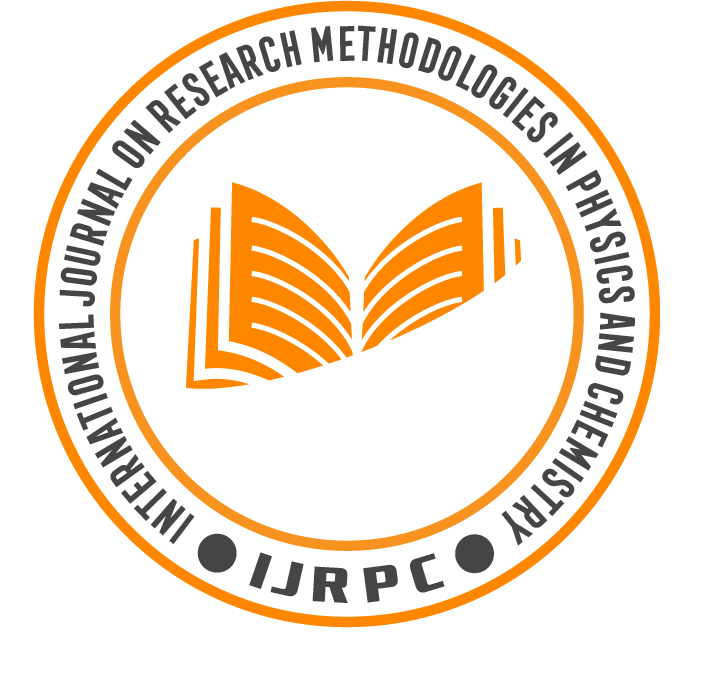Thermal Degradation of Waste Acrylic Laboratory Ware to Fuel and Chemicals
Main Article Content
Abstract
The present work includes the thermal degradation of waste acrylic plastics to value added products. Damaged chemistry laboratory burettes made of PMMA were thermally decomposed in a semi batch reactor in atmospheric pressure at temperature range of 350?550?C to convert it into useful liquid fuel and chemicals. The process could convert the waste completely into major liquid, gaseous products and very small amount of solid residue. The yield of the condensed product has been studied as a function of temperature and was found low (75.66wt.%) at 350?C, increased to a maximum of 95.3wt.% at 450?C and then gradually decreased with further increase in temperature.The composition of the oil fraction was characterized by Gas chromatography-Mass spectroscopy and is found consisting of different hydrocarbons and oxygenated organic compound carrying C7-C22 components. Fuel properties of the oil obtained by different standard methods are similar to petrochemical fuels. On the basis of the obtained results hypothetical continuous process of acrylic plastics waste processing for engine fuel production can be presented.
Article Details
References
W. Kaminsky, and J. Franck, “Monomer recovery by pyrolysis of polymethyl methacrylate (PMMA),” J Anal Appl Pyrol, Vol. 19, pp. 311-318, 1991.
W. Kaminsky, M. Predel, and A. Sadiki, “Feedstock recycling of polymers by pyrolysis in a fluidised bed,” Polymer Degradation and Stability, Vol. 85, pp. 1045-1050, 2004.
B.S.Kang, , S.G.Kim, and J.S. Kim, “Thermal degradation of poly (methyl methacrylate) polymers: Kinetics and recovery of monomers using a fluidized bed reactor,” Journal of Analytical and Applied Pyrolysis, Vol.81,pp.7-13, 2008.
A.Oriñák, L.Halás, I.Amar, J.T.Andersson, and M. Ádámová, “Co-pyrolysis of polymethyl methacrylate with brown coal”. Fuel, Vol.85, pp. 12- 18, 2006.
K. Smolders, and J. Baeyens, “Thermal degradation of PMMA in fluidised beds,” Waste Management, Vol.24, pp.849-857, 2004.
K. Supaporn, PhD Thesis, Catalytic degradation of poly(methyl methacrylate) by zeolites and regeneration of used zeolites via ozonation, Chemical and Environmental Engineering, INP Toulouse, FRANCE, 2012.
L.A. Salam, R.D.Matthews, and H.Robertson, “Pyrolysis of poly-methylmethacrylate (PMMA) binder in thermoelectric green tapes made by the tape casting method,” Journal of the European Ceramic Society, Vol.20,pp.335-345, 2000.
B.J.Holland, and J.N. Hay, “ effect of polymerisation conditions on the kinetics and mechanisms of thermal degradation of PMMA,”. Polymer Degradation and Stability Vol.77, pp.435-439,2002.
Kashiwaki, T. et al. “Effects of weak linkages on the thermal and oxidative degradation of poly (methyl methacrylates),” Macromolecules, Vol.19, pp.2160-2168, 1986.
L.E. Manring, “Thermal degradation of poly(methyl methacrylate).2. Vinyl-terminated polymer,” Macromolecules Vol.221, pp. 2673-2677, 1989.
M.H.Cho, S.H.Jung, and J.S.Kim, “Pyrolysis of mixed plastic wastes for the recovery of benzene, toluene and xylene (BTX) aromatics in a fluidized bed and chlorine removal by applying various additives,” Energy Fuels, Vol. 24, pp.1389-1395, 2010.
J.D.Peterson, S.Vyazovkin, and C.A. Wigh, “Kinetic Study of Stabilizing Effect of Oxygen on Thermal Degradation of Poly(methyl methacrylate),” The Journal of Physical Chemistry B, Vol.103, pp.8087-8092, 1999.
K.Pielichowski, and J. Njuguna, “Thermal Degradation of Polymeric Materials,” Shropshire :Rapra Technology Limited, 2005.
